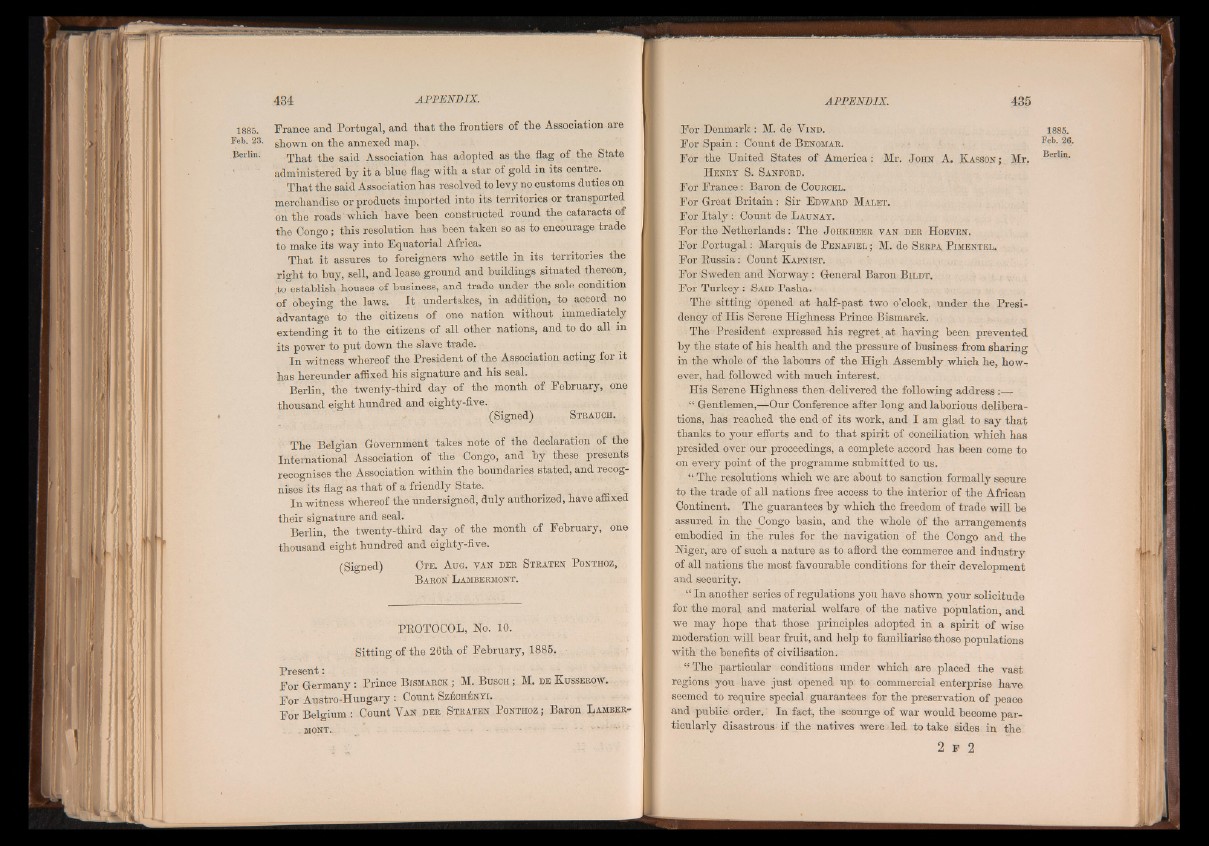
1885. France and Portugal, and th a t the frontiers of the Association are
Feb. 23. gtxown on the annexed map,
Berlin. Th a t the said Association has adopted as the flag of the State
administered by it a blue flag with a star of gold in its centre.
Th at the said Association has resolved to levy no customs duties on
merchandise or products imported into its territories or transported
on the roads which have heen constructed round the cataracts of
the Congo ; this resolution has heen taken so as to encourage trade
to make its way into Equatorial Africa.
That it assures to foreigners who settle in its territories the
rig h t to huy, sell, and lease ground and buildings situated thereon,
toestablish houses of business, and trade under the sole condition
of obeying the laws. I t undertakes, in addition, to accord no
advantage to the citizens of one nation without immediately
extending it to the citizens of all other nations, and to do all in
its power to pu t down the slave trade.
In witness whereof the President of the Association acting for it
has hereunder affixed his signature and his seal.
Berlin, the twenty-third day of the month of February, one
thousand eight hundred and -eighty-five.
( S i g n e d ) S tr a u c h .
The Belgian Government takes note of the declaration of the
International Association of the Congo, and by these presents
recognises the Association within the boundaries stated, and recogn
ises its flag as th a t of a friendly State.
In witness whereof the undersigned, duly authorized, have affixed
their signature and seal.
Berlin, the twenty-third day of the month of February, one
thousand eight hundred and eighty-five.
(Signed) C t e . Aus. v a n d e e S tr a t e n P onthoz,
B aron L ambermont.
PROTOCOL, No. 10.
Sitting of the 26th of February, 1885.
P re sen t:
For Germany: Prince B ismarck ; M. B usch | M. b e K usseeow.
For Austro-Hungary : Count SzticHinjYi.
For Belgium : Count Yak d e e S tr a t e n P o n th o z ; Baron L am b e e -
. MONT...
For Denmark : M. de V in d .
For Spain : Count de B enomar .
For the United States of America: Mr. J ohn A. K a s so n ; Mr.
H e n e y S. S a n fo ed .
For France : Baron de C ouecel.
For Great Britain : Sir E dward M a l e t .
For Ita ly : Count de L a d n a y .
For the Netherlands : The J o h k h eer v a n d e e H o ev en .
For Portugal : Marquis de P e n a f ie l • M. de S e r pa P im e n t e l .
For Russia : Count K a pn is t .
For Sweden and Norway: General Baron B il d t .
For Turkey : S a id Pasha.
The sitting opened at half-past two o’clock, under the Presidency
of His Serene Highness Prince Bismarck.
The President expressed his regret a t having been prevented
by the state of his health and the pressure of business from sharing
in the whole of the labours of the High Assembly which he, however,
had followed with much interest.
His Serene Highness then delivered the following address :—
“ Gentlemen,—Our Conference after long and laborious deliberations,
has reached the end of its work, and I am glad to say th a t
thanks to your efforts and to th a t spirit of Conciliation which has
presided over our proceedings, a complete accord has been come to
on every point of the programme submitted to us.
“ The resolutions which we are about to sanction formally secure
to the trade of all nations free access to the interior of the African
Continent. The guarantees by which the freedom of trade will be
assured in the Congo basin, and the whole of the arrangements
embodied in the rules for the navigation of the Congo and the
Niger, are of such a nature as to afford the commerce and industry
of all nations the most favourable conditions for the ir development
and security.
“ In another series of regulations you have shown your solicitude
for the moral and material welfare of the native population and
we may hope th a t those principles adopted in a spirit of wise
moderation will bear fruit, and help to familiarise those populations
with the benefits of civilisation.
The particular conditions Under which are placed the vast
regions you have ju st opened up to commercial enterprise have
seemed to require special guarantees for the preservation of peace
and public order. In fact, the .scourge of war would become particularly
disastrous if the natives were led to take sides in the
2 f 2
Berlin.